inotarobot
Veteran Member
OK all you Digital computer buffs here are some Survey questions I am posing on analog computers
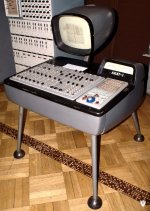
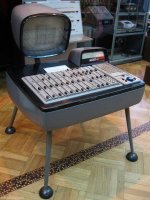 This AKAT-1, by the way, is my favorite analog computer, as the look is soooooo cool. Wish I could own one.
This AKAT-1, by the way, is my favorite analog computer, as the look is soooooo cool. Wish I could own one.
Q1. If you could locate an analog computer in your budget range
a. would you buy it ?
b. If one you really liked came up, BUT outside your budget, how much would you consider paying for one in US$ or Euros ?
Q2a. If you were given or left a working analog computer, would you
A. keep it or
B. sell it, or
C. give it away ?
Q2b. If you were given or left a NON working analog computer, would you
A. keep it and work to get it fully operational or
B. sell it in a non working state, or
C. give it away, again in a non working state ?
Q3. Ok so lets for a now assume, you suddenly had a working analog computer come into your possession,
what task would you think you could do with it ?
Please DONT Google for an answer about the tasks one can do with such a machine, just answer from your existing knowledge base, as it interesting to me
Q4. If you had the chance to build a brand new state of the art Analog Computer, would you
A. jump at the chance
or
B. go nar, I would prefer to wait to get a vintage machine ?
Q5 Have you ever or do you currently owned an analog computer
A. Yes
B. No
Ok Q6. so early analog computer were made using various technologies.
A. all Mechanical ie Gears and Differentials or Rotatable Cardboard Disks
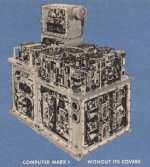
B. all Vacuum Tube Valves
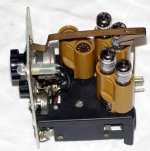
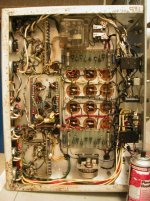
C. Transistors era
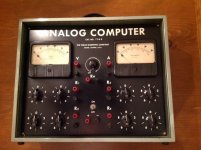
D. early integrated circuits.
next 2 pics are from this wonderful web site
http://www.earlycomputers.com/cgi-bin/item-report-main.cgi?20051031a
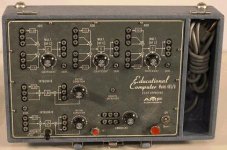
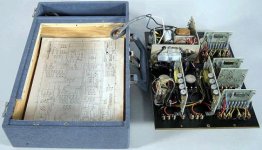
So out of A,B,C and D styles
the question 6 is from the 4 constructional types just mentioned, do you have a preference of type you would like to own ?
Q7 Do you own any paper books on Analog computers ? and if so how many ?
and the last question for now is
Q8 Do you have any parts of or from an Analog computer ?
if so A. are you looking to find more of that machine ? maybe to get it working.
or B are you maybe thinking of selling or disposing of these parts
Looking forward to hearing answers
thanks in advance for reading and hopefully answering
As a parting note this is a pic of my EAI TR-20 Analog computer. Its such a great machine and I am so proud to have it
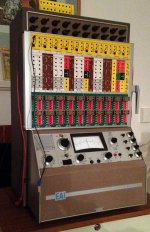

 This AKAT-1, by the way, is my favorite analog computer, as the look is soooooo cool. Wish I could own one.
This AKAT-1, by the way, is my favorite analog computer, as the look is soooooo cool. Wish I could own one.Q1. If you could locate an analog computer in your budget range
a. would you buy it ?
b. If one you really liked came up, BUT outside your budget, how much would you consider paying for one in US$ or Euros ?
Q2a. If you were given or left a working analog computer, would you
A. keep it or
B. sell it, or
C. give it away ?
Q2b. If you were given or left a NON working analog computer, would you
A. keep it and work to get it fully operational or
B. sell it in a non working state, or
C. give it away, again in a non working state ?
Q3. Ok so lets for a now assume, you suddenly had a working analog computer come into your possession,
what task would you think you could do with it ?
Please DONT Google for an answer about the tasks one can do with such a machine, just answer from your existing knowledge base, as it interesting to me
Q4. If you had the chance to build a brand new state of the art Analog Computer, would you
A. jump at the chance
or
B. go nar, I would prefer to wait to get a vintage machine ?
Q5 Have you ever or do you currently owned an analog computer
A. Yes
B. No
Ok Q6. so early analog computer were made using various technologies.
A. all Mechanical ie Gears and Differentials or Rotatable Cardboard Disks

B. all Vacuum Tube Valves


C. Transistors era

D. early integrated circuits.
next 2 pics are from this wonderful web site
http://www.earlycomputers.com/cgi-bin/item-report-main.cgi?20051031a


So out of A,B,C and D styles
the question 6 is from the 4 constructional types just mentioned, do you have a preference of type you would like to own ?
Q7 Do you own any paper books on Analog computers ? and if so how many ?
and the last question for now is
Q8 Do you have any parts of or from an Analog computer ?
if so A. are you looking to find more of that machine ? maybe to get it working.
or B are you maybe thinking of selling or disposing of these parts
Looking forward to hearing answers
thanks in advance for reading and hopefully answering
As a parting note this is a pic of my EAI TR-20 Analog computer. Its such a great machine and I am so proud to have it

